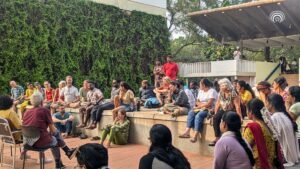Auroville, the international township nestled in the serene landscapes of South India, is renowned for its commitment to human unity and sustainable living. At its core, Auroville’s governance is characterized by principles of anarchy and accountability, where residents actively participate in decision-making processes through the Residents’ Assembly. In this article, we delve into the best practices that guide this unique system, enabling a harmonious balance between autonomy and responsibility within the Assembly.
Anarchy and Autonomy:
The term “anarchy” often conjures images of chaos and disorder. However, in Auroville’s context, anarchy implies a decentralized, non-hierarchical system where power is shared among all residents. It allows for a high degree of personal autonomy and collective decision-making. The Residents’ Assembly serves as the embodiment of this anarchy, where decisions are made through consensus, and residents participate equally.
1. Open Dialogue and Inclusivity:
One of the best practices within Auroville’s Residents’ Assembly is the promotion of open dialogue and inclusivity. All residents have the opportunity to express their opinions, ensuring that every voice is heard, valued, and considered in decision-making. This inclusivity fosters a sense of belonging and empowerment, affirming the principle of anarchy while embracing accountability.
2. Collective Decision-Making:
Auroville’s Residents’ Assembly prioritizes collective decision-making. Rather than relying on a top-down approach, residents come together to discuss, propose solutions, and reach a consensus on various matters, ranging from infrastructure development to environmental sustainability. This practice ensures that residents have an active say in shaping the community’s future, promoting both autonomy and responsibility.
3. Transparency and Accountability:
Transparency and accountability are fundamental principles that guide Auroville’s decision-making process. The Assembly operates with a high degree of transparency, where residents have access to information regarding discussions, proposals, and outcomes. This openness encourages accountability, as residents are aware of the decisions and their consequences.
Balancing Anarchy and Responsibility:
The delicate balance between anarchy and responsibility within Auroville’s Residents’ Assembly is not without its challenges. It requires a collective commitment to harmonize autonomy with accountability. Residents must navigate the fine line between individual freedom and the well-being of the community.
1. Balanced Decision-Making:
One of the key challenges is achieving a balance between individual autonomy and collective responsibility. Some residents may advocate for ambitious, long-term projects aligned with Auroville’s spiritual vision, while others may prioritize immediate and tangible solutions to pressing issues. Striking the right balance is an ongoing challenge that demands a commitment to finding common ground.
2. Consensus-Based Approach:
The consensus-based approach, while inclusive, can be time-consuming. Important decisions may take longer to reach, which can be frustrating for those seeking quick resolutions. Yet, this very aspect is what sets Auroville’s decision-making process apart. It honors every voice and seeks unity amidst diversity, even if it takes time.
Best Practices for Accountability:
Auroville’s Residents’ Assembly has developed best practices to maintain accountability while preserving the spirit of anarchy. These practices help residents navigate the challenges and strike a balance between personal autonomy and community responsibility.
1. Regular Review and Evaluation:
One of the essential practices within the Assembly is regular review and evaluation of decisions. Residents often assess the impact of past decisions on the community and make necessary adjustments. This ongoing evaluation process promotes accountability by ensuring that decisions are in alignment with the community’s vision.
2. Transparent Reporting:
Auroville values transparency as a cornerstone of accountability. Regular reporting on decisions, their implementation, and their outcomes ensures that residents are well-informed about the Assembly’s activities. This transparency fosters trust and encourages residents to actively engage in the decision-making process.
3. Responsible Citizenship:
Residents are encouraged to embody responsible citizenship by actively participating in the Assembly and taking their roles seriously. This involves attending meetings, actively engaging in discussions, and contributing to the decision-making process. The community places a premium on the responsibility of residents to be engaged and informed.
A Model of Collective Governance:
Auroville’s Residents’ Assembly represents a model of collective governance where anarchy and accountability coexist harmoniously. The best practices within the Assembly empower residents to participate actively in shaping their community’s future, while also recognizing their individual responsibility towards the collective well-being.
The Residents’ Assembly is not just a decision-making body; it is a living manifestation of Auroville’s ideals of unity and sustainable living. Through its decisions and practices, it showcases the transformative potential of collective decision-making and the beauty of a united, culturally rich, and harmonious community.
Conclusion:
Auroville’s Residents’ Assembly operates on the principles of anarchy and accountability, and it is a testament to the balance that can be achieved between personal autonomy and community responsibility. The best practices within the Assembly promote open dialogue, collective decision-making, transparency, and responsible citizenship.
In a world where governance often emphasizes hierarchy and centralized authority, Auroville stands as an example of how a community can thrive when residents actively engage in shaping its future. The Residents’ Assembly is a model of collective governance that showcases the potential of harmonious anarchy, and it continues to inspire communities worldwide to explore the possibilities of decentralized decision-making and human unity.



